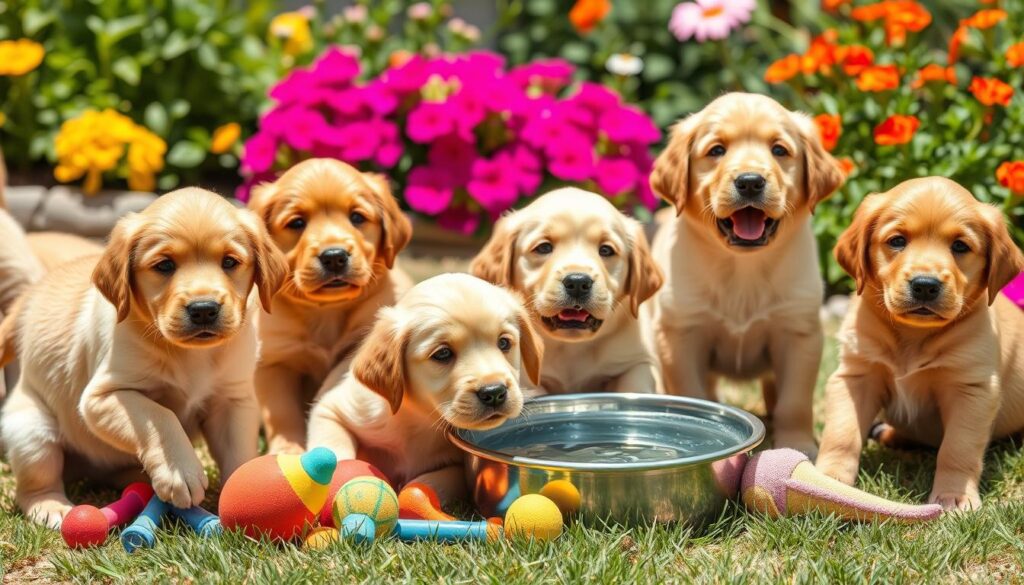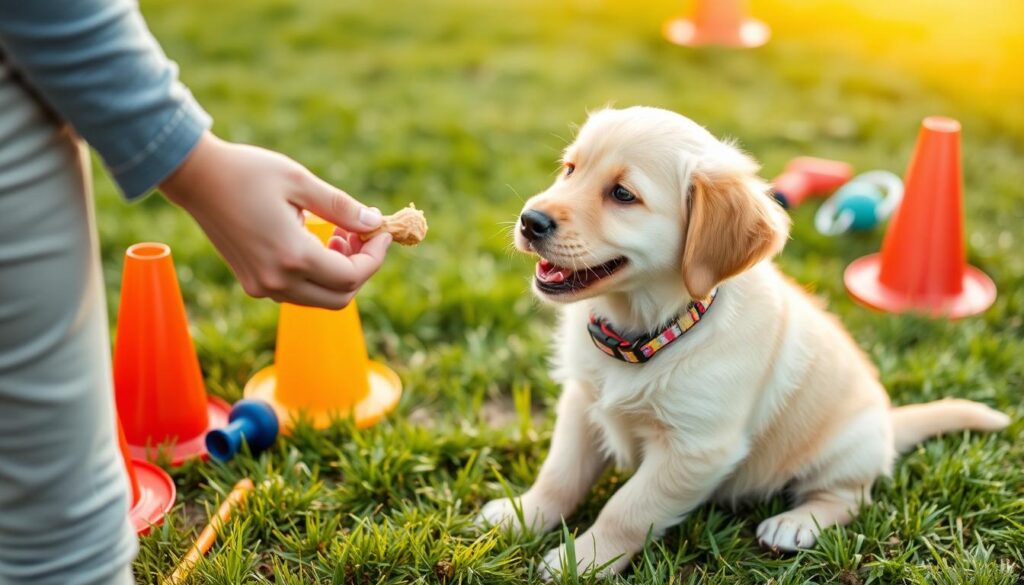A staggering 100% of featured golden retriever puppies have found their forever homes. This shows how popular this breed is. Their beautiful golden coats and loving personalities make them a favorite among families.
The Golden Retriever Club of America says they are smart and easy to train. This makes them great for both new and experienced dog owners.
When looking to add a golden retriever puppy to your family, choose a reputable breeder. They should care about the health and well-being of their puppies. With proper care, these puppies can become loving and loyal companions, bringing joy for years.
This guide is for anyone looking to bring a golden retriever puppy home. We’ll cover their breed heritage, training, and care. Our goal is to help you choose the perfect puppy for your lifestyle.
Understanding the Golden Retriever Breed Heritage
The Golden Retriever breed has a rich history, starting in the late 19th century in Scotland. The American Kennel Club says they were bred to help hunters retrieve game. Lord Tweedmouth created the breed by mixing a Yellow Retriever named “Nous” with a Tweed Water Spaniel, getting four pups.
A reputable golden retriever breeder knows a lot about the breed’s history. When searching for top-rated golden retriever puppies, it’s key to check the breeder’s experience. The Golden Retriever’s true origins were questioned as early as 1929. It wasn’t until the 1950s that their documented lineage was accepted.
Golden Retrievers are known for being smart, loyal, and gentle. These qualities make them great family pets and working dogs. They are excellent at guiding, helping the disabled, and in search and rescue work.
- Golden Retrievers were officially recognized as a breed in 1920.
- The breed became popular worldwide, leading to regional subtypes like American, British, and Canadian.
- The British subtype has a bigger skull and denser body, while the American subtype is leaner with a lighter coat.
When searching for a reputable golden retriever breeder, look into their experience and reputation. A good breeder will understand the breed’s history and provide top-rated golden retriever puppies. These puppies will be healthy, well-socialized, and well-cared for.
Finding Reputable Golden Retriever Puppies for Sale
Looking for healthy golden retriever puppies means finding a good breeder. A good breeder cares about their puppies’ health. The Golden Retriever Club of America says a good breeder will give you all the info you need.
To find a good breeder, start by researching. Ask important questions. Make sure they follow the Golden Retriever Club of America’s Code of Ethics.
Here are some things to look for in a reputable breeder:
- Verifiable hip, elbow, eye, and heart certifications for both sire and dam
- Experience and number of litters bred
- Years as a breeder
- Health and temperament of the sire, dam, and their relatives
Good breeders will also ask you about your experience with dogs. They want to know if you can care for a puppy. They’ll ask about your lifestyle and plans for training and exercising the golden retriever puppy.
By following these golden retriever puppy care tips, you’ll get a healthy puppy. Check if the breeder is a member of the Golden Retriever Club of America. This means they follow strict rules and pay dues, like $55.00 in the U.S.

Researching and finding a reputable breeder is key. This way, you’ll get a healthy golden retriever puppy for your family. Always put your puppy’s health first. Follow golden retriever puppy care tips for a happy life together.
Essential Health Considerations for Your Puppy
As a responsible owner of akc registered golden retriever puppies, knowing about health issues is key. Golden Retriever puppies can face problems like hip dysplasia and eye issues. Regular vet visits and care can help manage these.
Golden Retriever puppies might also deal with joint issues, allergies, and cancer. It’s important to take them for yearly vet checks. DNA tests can also spot genetic health risks. A diet rich in protein is vital for their health.
To ensure your golden retriever puppies stay healthy and joyful, regular exercise and a balanced diet are musts. Don’t forget about vet check-ups. Here are some key health tips to remember:
- Regular veterinary check-ups
- Preventive care measures, such as vaccinations and parasite control
- A balanced diet with protein as the main ingredient
- Regular exercise, including daily walks and playtime
By understanding and addressing these health concerns, you can help your golden retriever puppies enjoy a long, happy life.
| Health Issue | Description | Prevention/Management |
|---|---|---|
| Hip Dysplasia | A genetic condition that affects the hip joint | Regular veterinary check-ups, weight management, and exercise modification |
| Allergies | Adverse reactions to food or environmental triggers | Identify and avoid triggers, use medication or immunotherapy as needed |
| Cancer | A disease that affects cells and tissues | Regular veterinary check-ups, screening tests, and treatment as needed |

The First Month With Your Golden Retriever Puppy
Welcoming a golden retriever puppy is exciting. The first month is key for socialization and training. It’s important to create a safe and loving space for them. A routine for feeding, exercise, and play is essential.
Puppies eat three to four times a day in the first week. As they grow, feed them three times a day. Watch their health and start house training early. Consistency is key for potty training. Use rewards and praise for good behavior.
Introduce your puppy to the outside world slowly. This helps them get used to new things. Socialization with family and other pets is also important. Start socialization classes early to help them develop social skills.
Make sure to give each dog individual attention and separate safe spaces. Use toys and treats for positive play. With patience and care, your puppy will grow into a well-adjusted companion.
Here are some key takeaways for the first month with your golden retriever puppy:
- Establish a routine for feeding, exercise, and playtime
- Begin house training early on and maintain consistency
- Introduce your puppy to the outside world with short, supervised outdoor exposures
- Enroll your puppy in socialization classes as early as eight weeks old
- Individualize attention for each dog and provide separate safe spaces
By following these tips and providing a nurturing environment, your puppy will grow into a happy and healthy golden retriever.
Training Your Golden Retriever Puppy
When you bring home a puppy from a reputable golden retriever breeder, start training right away. Golden Retrievers are smart and love positive training. They need consistency, patience, and positive feedback to learn well.
The American Kennel Club says Golden Retrievers are a top choice for families. They’re smart and easy to train, making them great pets.
A healthy golden retriever puppy needs a routine. This includes regular training, socializing, and lots of exercise. Here are some tips to help you:
- Start with basic commands, such as “sit” and “stay”
- Use positive reinforcement, such as treats and praise, to encourage good behavior
- Socialize your puppy with other dogs, people, and new environments to help them become confident and calm

Training a Golden Retriever puppy takes time and effort. But with patience and consistency, you can raise a well-behaved and loyal friend. Follow these tips and work with a reputable breeder for a happy, healthy relationship with your new furry friend.
Nutrition and Feeding Guidelines
When it comes to golden retriever puppy care tips, nutrition is key. As an owner of akc registered golden retriever puppies, a balanced diet is vital. The Golden Retriever Club of America says a high-quality puppy food is important for good digestion and preventing overeating.
A golden retriever puppy needs small meals all day. For example, a 2–3 month old puppy should eat 3 cups of dog food in three meals. By three months, they should eat 3 cups a day. By six months, they might need 3 to 4 cups. Here are some important feeding tips:
- Set a regular feeding schedule
- Avoid free-feeding
- Include water with meals
- Don’t give table scraps
As your golden retriever puppy grows, watch their weight closely. Adjust their food to keep them healthy. Add joint-supporting ingredients like glucosamine and chondroitin for active adult golden retrievers. Healthy treats like carrot sticks and blueberries are good too. Always talk to a vet about your golden retriever‘s changing needs.

Make sure your golden retriever puppy is growing well, has a good appetite, looks fit, has lots of energy, and has healthy fur, eyes, and skin. These signs mean they’re getting the right nutrition. By following these golden retriever puppy care tips and feeding them well, your akc registered golden retriever puppies will be happy and healthy.
Exercise and Physical Development Needs
Top-rated golden retriever puppies need regular exercise to stay healthy. The American Kennel Club says Golden Retrievers are very active. They need lots of physical activity and mental games to stay happy and healthy.
As puppies get older, they need more exercise. An 8-week-old puppy can start with 10-15 minutes of play. By 6 months, they can handle up to 45 minutes of playtime. It’s important to teach them different games like fetch and tug-of-war safely.
- Start with short playtimes and slowly add more time and intensity
- Teach them different games and let them play off-leash safely
- Watch how they behave and change their playtime as needed
- Give them mental challenges and social time to avoid bad behavior
By doing these things, you’ll help your golden retriever puppies grow into happy, healthy dogs.

Creating the Perfect Home Environment
For adorable golden retriever puppies to thrive, a safe and nurturing environment is key. The Golden Retriever Club of America says a hazard-free home is vital. This means removing dangerous items and securing toxic substances.
Designate areas for sleeping, feeding, and play. This helps your puppy feel secure and comfortable. A well-structured home environment is essential for their well-being.
Provide a quiet resting area for your puppy. Rotate toys every few weeks to keep them interested. This fresh stimulation is important for their development.
Puppy-Proofing Essentials
Puppy-proofing your home is critical to prevent accidents. Remove toxic plants and secure small objects. Install safety gates to keep your puppy safe.
Regularly check for damage or escape points. This ensures your puppy’s safety at all times.
Required Supplies and Equipment
Before bringing your puppy home, gather essential items. These include a kennel, bedding, food, and chew toys. High-quality puppy food is also important.
Adjust food quantities as needed and ensure fresh water is always available. This helps maintain a healthy diet for your puppy.

By creating a safe and nurturing environment, your golden retriever puppies can grow into happy dogs. Always prioritize their safety and well-being. Consult a veterinarian for advice on vaccinations, fleas, and tick prevention.
Conclusion: Embracing the Golden Retriever Puppy Journey
The journey with a Golden Retriever puppy is truly rewarding. You’ve learned how to care for them properly. A good golden retriever breeder can help by giving you a healthy puppy.
Keeping your Golden Retriever healthy is very important. Follow the golden retriever puppy care tips we shared. This includes a good diet and training. With time and effort, your puppy will become a loyal friend.
Enjoy the ups and downs of having a Golden Retriever puppy. From the first day to when they grow up, it’s filled with memories. These dogs bring endless love and energy into our lives.
FAQ
What are the key characteristics of the Golden Retriever breed?
Golden Retrievers have stunning golden coats and loving personalities. They are smart and gentle. Originally from Scotland, they are now a favorite dog breed worldwide.
How can I find a reputable Golden Retriever breeder?
To find a good Golden Retriever breeder, research their reputation and ask important questions. Make sure they are AKC-registered. They should share info on the puppy’s health, temperament, and family background.
What are the common health issues in Golden Retrievers?
Golden Retrievers are mostly healthy but can face issues like hip and elbow dysplasia, cancer, and eye problems. Regular vet visits, preventive care, and a healthy diet are key to their well-being.
How do I properly train and socialize my Golden Retriever puppy?
Training your Golden Retriever puppy is vital for their growth and happiness. Begin with basic commands and positive reinforcement. Also, socialize them well to make them confident and well-behaved.
What are the exercise and physical development needs of a Golden Retriever puppy?
Golden Retrievers need lots of exercise and mental stimulation. Play with them, teach them to fetch, and do obedience training. This ensures they grow physically and mentally strong.
How do I create the perfect home environment for my Golden Retriever puppy?
To create a great home for your Golden Retriever puppy, puppy-proof your space. Get a comfy crate, bedding, and toys. This will help them feel safe and loved.


